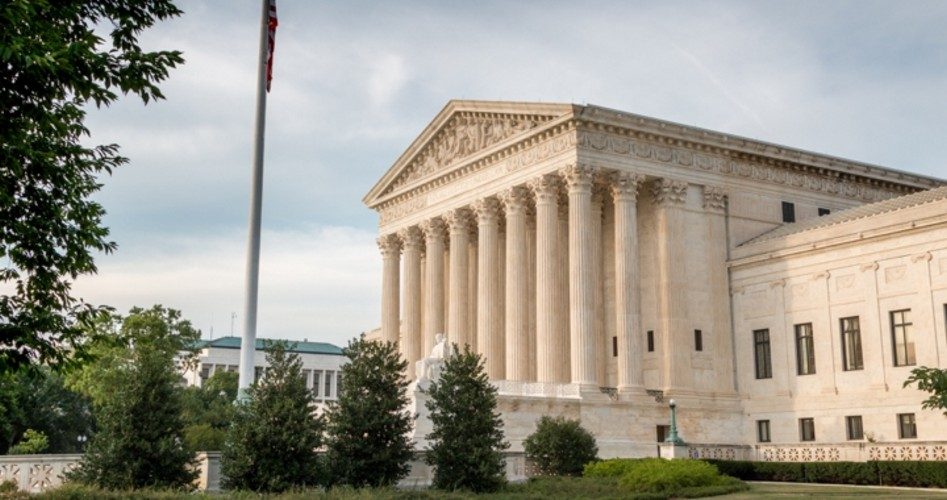
On Tuesday, the Supreme Court declined to hear a challenge to restrictions on medication-induced abortions in Arkansas, effectively upholding the law. The decision has been celebrated by pro-life groups as a major victory in the fight against abortion.
According to the Washington Times, the Arkansas law does not ban the use of pills for medication abortions, which take place during the first trimester, but requires abortion providers who issue the pills to sign a contract with a doctor who has admitting privileges to a nearby hospital in the event of an emergency complication. The New York Times reports that abortion clinics in Arkansas claim to be having a difficult time finding doctors willing to sign those contracts.
When the law was enacted in 2015, the Arkansas Legislature pointed to evidence that showed complications related to medication abortions resulted in eight deaths and hundreds of blood transfusions, hospitalizations, and infections. Of course, these deaths do not include the preborn babies who were intentionally killed, fulfilling the purpose of the “medication.”
“Protecting the health and well-being of women and the unborn will always be a priority. We are a pro-life state and always will be as long as I am attorney general,” said Arkansas Attorney General Leslie Rutledge, whose office has defended the law.
The law was initially blocked by a district judge, who claimed that it creates hurdles for women seeking abortions. But the 8th Circuit Court of Appeals determined that the lower court did not adequately prove the burden by providing information such as how many women would be forced to travel as a result of the law, etc. The Supreme Court’s decision returns the challenge to the 8th Circuit Court of Appeals, which had ruled that the law could go into effect.
But in spite of the evidence, Planned Parenthood contends that the law is just another opportunity to set up obstacles to abortion.
“Arkansas is now shamefully responsible for being the first state to ban medication abortion. This dangerous law immediately ends access to safe, legal abortion at all but one health center in the state. If that’s not an undue burden, what is?” said Dawn Laguens, executive vice president of Planned Parenthood Federation of America.
Planned Parenthood claims that if the law goes into effect, only surgical abortion will be available in Arkansas.
“This will particularly affect women who strongly prefer medication abortion,” the group told the Supreme Court, “including those who find it traumatic to have instruments placed in their vaginas because they are victims of rape, incest, or domestic violence, as well as women for whom medication abortion is medically indicated and safer than surgical abortion.”
For now, the law remains in place, effectively shutting down two of the three Planned Parenthood clinics in the state, both of which offer only medical abortions. The state’s only remaining abortion clinic, located in Little Rock, is the only one that would stay in operation, since it also performs surgical abortions.
The Supreme Court’s decision does not permanently lay the case to rest, however. If the lower courts sorted out the issues presented by the appeals court, the case could make its way back to the Supreme Court.
Rachel Rebouche, a law professor at Temple, observes, “I don’t think the court’s decision today influences the balancing approach set out in Whole Woman’s Health. A new opinion by the 8th [Circuit] might and might mean that the case will come before the [Supreme Court] again,” she said.
The Arkansas law is being compared to a Texas law that was struck down by the Supreme Court in 2016. That law also required abortion doctors to have admitting privileges in hospitals no more than 30 miles from the abortion facility. Unlike the Texas law, however, the Arkansas law focuses on just the medicine-induced abortions.
Arkansas officials argued that their state’s law was not quite as cumbersome as the one that failed in Texas.
“Arkansas law only requires medication abortion providers to have a contractual relationship (to ensure follow-up treatment if needed) with a physician that has admitting privileges,” the officials’ brief said.
Kristi Hamrick, spokesperson for Students for Life of America, contends the law contains common sense measures that ensure health and safety standards are met.
“Abortion vendors complain that holding them accountable for their sloppy standards might result in some clinics closing, which just goes to illustrate how anti-woman the abortion industry really is,” Hamrick said.
She told The Hill, “It’s up to legislators to decide which approach they want…. This law merely said in an emergency there needs to be a plan in place to make sure women don’t bleed to death.”
Photo: PorqueNoStudios/iStock/Getty Images Plus




